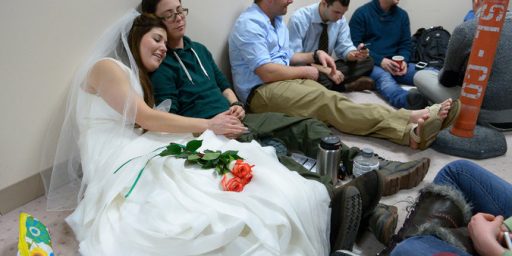Did Texas Ban Marriage?
 Barbara Ann Radnofsky, a Democratic candidate for Texas attorney general, claims a 2005 constitutional amendment designed to ban gay marriages actually bans all marriages.
Barbara Ann Radnofsky, a Democratic candidate for Texas attorney general, claims a 2005 constitutional amendment designed to ban gay marriages actually bans all marriages.
The amendment, approved by the Legislature and overwhelmingly ratified by voters, declares that “marriage in this state shall consist only of the union of one man and one woman.” But the troublemaking phrase, as Radnofsky sees it, is Subsection B, which declares: “This state or a political subdivision of this state may not create or recognize any legal status identical or similar to marriage.”
Architects of the amendment included the clause to ban same-sex civil unions and domestic partnerships. But Radnofsky, who was a member of the powerhouse Vinson & Elkins law firm in Houston for 27 years until retiring in 2006, says the wording of Subsection B effectively “eliminates marriage in Texas,” including common-law marriages.
She calls it a “massive mistake” and blames the current attorney general, Republican Greg Abbott, for allowing the language to become part of the Texas Constitution. Radnofsky called on Abbott to acknowledge the wording as an error and consider an apology. She also said that another constitutional amendment may be necessary to reverse the problem. “You do not have to have a fancy law degree to read this and understand what it plainly says,” said Radnofsky, who will be at Texas Christian University today as part of a five-city tour to kick off her campaign.
While I don’t have any fancy law degrees, it’s pretty clear to me that the amendment does not endanger “marriage” in Texas. The key word in the clause in question is “create.” Given that 1) marriage existed in Texas before the amendment and 2) that the first clause in the amendment reiterates the existence of marriage, merely clarifying its definition, the subsequent clause rather clearly bans only the creation of analogous institutions.
Regardless, this controversy is amusing.
Story: Memeorandum. Photo: FlutterFly Events.






Hm…okay, you’ve got a point about “create”. But what about “recognize”? That reads to me like Texas can’t recognize marriage. 🙂
It would surely be a tragedy if we could no longer rely upon the government for recognition of our intimate relationships. So 19th century.
I think Radnofsky reads the “identical or similar” language out of the statute:
“This state or a political subdivision of this state may not create or recognize any legal status
identical or similar to[of] marriage.â€I think the real point is a local one. And that is just that Abbot seems to have done a poor job. I think what Radnofsky really wants is to just embarrass Abbot into admitting that he didn’t do a very good job of checking the language.
Also, in the original article, Abbot also seems to be misunderstanding Radnofsky. Radnofsky says that an amendment may be necessary. Abbot seems to think that Radnofsky is saying that because she is claiming that the amendment is somehow unconstitutional. That’s not at all what she is saying. She is saying that an amendment may be necessary to fix the poor wording.
Well, I can agree with JJ on “create”. But I think there’s a case to be made that “recognize any legal status identical … to marriage” would in fact mean marriage itself.
Can one say that marriage is identical to marriage? Am I identical to myself?
But in the end, it’s just an amusing ploy; I don’t think anybody after reading the amendment as a whole would come to the conclusion that it bans all marriages.
More evidence for me that the state should just get the hell out of the marriage business. Period.
@PD
You got that right. BTW, this just occurred to me. If, among other things, marriage is a contract between two people, could one argue that states that outlaw gay marriage are, in effect, denying the right to contract? I wonder if Olson and Bois are attacking the laws on this ground, inter alia? Do you know, PD?
Nice to see one place in this country where Muslims are not only welcome, but free to multiply like rabbits.
Logically it does,
x ≡ x.
Replace x with the word marriage and the symbol in the middle means identical to. Whoops. Really, its just that simple.
Marriage “is identical to” Marriage. Thus, the State cannot recognize of create anything like marriage.
Shocking.
By that logic people or anything can be unique. I’m not unique because I’m identical to myself.
Look up the definition of identical.
“exactly the same as or equal to “something elseâ€, or alike in every respectâ€
Is the spam filtering not allowing any links now days?
I think the point that James is trying to make is that the concept of “marriage” has already been created. So this is just preventing the state from creating any new types of unions.
I think both interpretations are plausible. Also, I suspect that there is some fancy philosophy or language term for these two types of interpretations, but I don’t know what it is. In Computer Science, we would say that it depends on whether we are interpreting “marriage” as a class or an instance of a class (object).
@Wayne: By your definition, of course, any marriage is identical to any other marriage. Thus, you run into the same problem, though you now have the additional issue that a marriage is “a union between one man and one woman” — where that specific union (“a union”) and the presupposed man and woman are unspecified. Thus, only one marriage is allowed in the state; which one is up for debate.
Poor language in state bills is a cause for nearly endless amusement…
I think the professor is flunking logic and grammar.
There is also an even stronger case to be made it bars the state from recognizing common law marriages.
“This state or a political subdivision of this state may not create or recognize any legal status identical or similar to marriage.â€
No problem with “create” but it bans any recognition of x identical or similar to x.
But the phrase is “create OR recognize” not “create AND recognize”. We’re not arguing about the “create” part; we’re arguing about the “recognize” part.
Hee hee, funny counterpoint. Does this law protect the sanctity of marriage, or does it protect the sanctity of marriages?
Re “By your definition, of course, any marriage is identical to any other marriage.â€
In the eyes of the state, Yes. It’s call equal treatment. In the eyes of the state a marriage between a black woman and man is identical to a marriage between a white woman and a man. Laws are commonly written in singularity but it is silly to think they are only to apply for exactly one case. In fact to try to do so would run into constitutional issues. For example a defendant has a right to be read his Miranda rights. Does that mean it only applies to one person in only one case? Of course not. Try another warp spin.
The amendment defines what constitute a marriage and that the definition cannot be infringed upon. Try to twist and warp the words use will not change that and the intent was well known. Any bets the Texas Supreme Court will not take it that way?
Certainly out of state marriages are not quite the same as marriages performed in the state, and now Texas cannot recognize them.
Good job “protecting traditional marriage”, d—-nozzles!